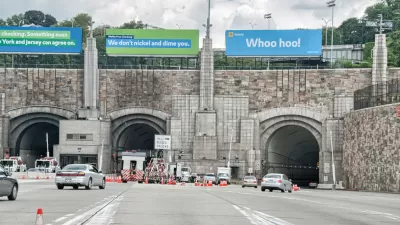New in flaneur-enabling technology: a team of intrepid aesthetes in Barcelona is working on a new app that would advance GPS mapping tools by providing the most beautiful route to a destination, rather than the shortest or least congested route.
Those of us obsessed with the navigation and mapping powers of route-calculating apps will soon have more aesthetically-minded options for finding a route across town, thanks to the work of Daniele Quercia and friends at Yahoo Labs in Barcelona, Spain. An article in the MIT Technology Review explains that Quercia and team "have worked out how to measure the 'beauty' of specific locations within cities and then designed an algorithm that automatically chooses a route between two locations in a way that maximizes the beauty along it. 'The goal of this work is to automatically suggest routes that are not only short but also emotionally pleasant,' they say."
The team used a number of methods to collect data on which places in London are more, shall we say, fetching. First there was crowdsourcing via public opinion: "Quercia and co begin by creating a database of images of various parts of the center of London taken from Google Street View and Geograph, both of which have reasonably consistent standards of images. They then crowdsourced opinions about the beauty of each location using a website called UrbanGems.org." (StreetSeen is a similar system for crowd sourcing public reaction to cityscapes.)
The second involved scraping data from photo sharing sites like Flickr: "Crowdsourcing opinion for every possible location in a city is clearly a time-consuming and potentially expensive business. So Quercia and co have automated this process using photos from Flickr and the data and tags attached to them," and, "[factors] that turn out to be a good indicator of beauty are things like the number of pictures taken of a particular scene and comments associated with positive emotions."
As for choosing the more beautiful route, it might just take a little longer: "Quercia and co say that on average these routes turn out to be just 12 percent longer than the shortest routes, which makes them reasonable alternatives for a pedestrian."
FULL STORY: Forget the Shortest Route Across a City; New Algorithm Finds the Most Beautiful

Maui's Vacation Rental Debate Turns Ugly
Verbal attacks, misinformation campaigns and fistfights plague a high-stakes debate to convert thousands of vacation rentals into long-term housing.

Planetizen Federal Action Tracker
A weekly monitor of how Trump’s orders and actions are impacting planners and planning in America.

In Urban Planning, AI Prompting Could be the New Design Thinking
Creativity has long been key to great urban design. What if we see AI as our new creative partner?

King County Supportive Housing Program Offers Hope for Unhoused Residents
The county is taking a ‘Housing First’ approach that prioritizes getting people into housing, then offering wraparound supportive services.

Researchers Use AI to Get Clearer Picture of US Housing
Analysts are using artificial intelligence to supercharge their research by allowing them to comb through data faster. Though these AI tools can be error prone, they save time and housing researchers are optimistic about the future.

Making Shared Micromobility More Inclusive
Cities and shared mobility system operators can do more to include people with disabilities in planning and operations, per a new report.
Urban Design for Planners 1: Software Tools
This six-course series explores essential urban design concepts using open source software and equips planners with the tools they need to participate fully in the urban design process.
Planning for Universal Design
Learn the tools for implementing Universal Design in planning regulations.
planning NEXT
Appalachian Highlands Housing Partners
Mpact (founded as Rail~Volution)
City of Camden Redevelopment Agency
City of Astoria
City of Portland
City of Laramie



























